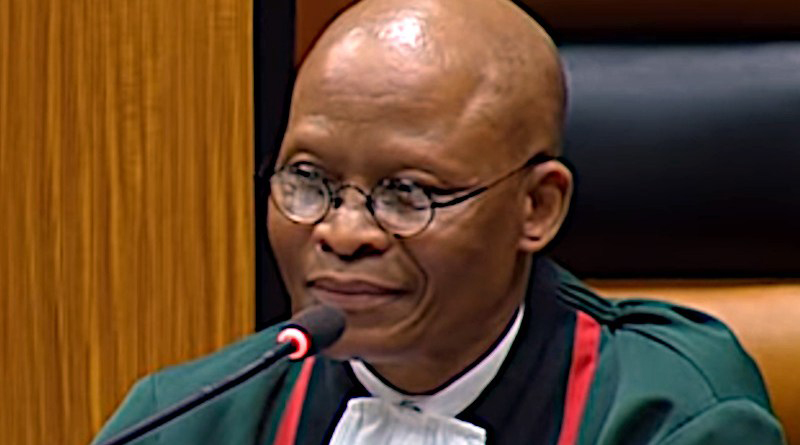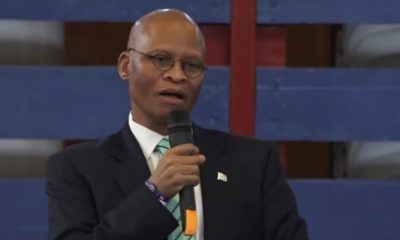
Featured Item

Judge slams censure of Mogoeng’s pro-Israel views
A trailblazing judge has emerged as a lone voice defending former Chief Justice Mogoeng Mogoeng’s support of Israel.
As one of three judges who reviewed his appeal, Judge Margaret Victor said, “muzzling judges is a slippery path that leads away from, not towards, democracy, and it leads in a direction from which there may be no road back.”
Victor said she would have upheld Mogoeng’s appeal in its entirety, but was outvoted by her fellow judges on the Judicial Conduct Appeals Committee. All three judges, however, decided to amend the original sanction as they all found issues with the original judgment. Mogoeng still needs to apologise for his comments supporting Israel in a 2020 webinar. However, this apology has been “severely curtailed”, says Chelsea Ramsden, senior legal researcher at the Helen Suzman Foundation.
Victor called out the double standards within her fellow judges’ arguments and those of the organisations that took Mogoeng to court. “As I read the comments made by Mogoeng in the context in which they must be read, I cannot see that the plea for peace and love for Jews and Israel and the love for Palestinians and Palestine, and any other utterances made in that context, can be construed in such a way as to undermine the dignity of his judicial office. Clearly, Mogoeng was expressing concern for love and peace globally, locally, and in relation to the Israeli-Palestinian conflict. And that he was entitled to do.”
She emphasised that “South Africa is a vibrant democracy and is still growing. Mogoeng asserts that judges, as citizens with fundamental rights and freedoms, shouldn’t be ‘censored, gagged or muzzled’. In my view, this is correct, for if we muzzle and gag a judge, justice, or chief justice from speaking out about world peace and stating on a public platform that nations shouldn’t hate each other, then we are dispiriting democracy instead of deepening it.”
According to Victor, “South African democracy has been hard-won, and Mogoeng’s emulation of the model adopted by President Nelson Mandela to be a mediator and game-changer is no random choice. The lifeblood of his comments was the successful Mendelian model of peace-making coupled with his deeply held convictions based on his Christian faith.
“This combination isn’t sufficient to demonstrate that Mogoeng became involved in a political controversy.
“Ultimately, ours is a nation that believes in the public exchange of ideas and open debate. Whilst I agree that judges and officers of the judiciary, by virtue of the sacrosanct positions that they occupy, are called upon to exercise caution and restraint in expressing their constitutional rights, these are still rights that are extended to them,” wrote Victor.
She said the chief justice’s comments were “no different from saying that the internal wars in Ethiopia and Afghanistan should come to an end by mediated peace solutions. A plea for peace is not itself political.”
To suggest that Mogoeng entered a “political dispute” sets a dangerous precedent, Victor said. “To find that a judge calling for peace among nations, and in particular between Israel and Palestine, has entered the realm of ‘judicial politicking’ leaves one wondering whether judges can comment at all or ever on peaceful solutions to global conflict.
“Judges in South Africa have over time, expressed extra-judicial thoughts and input and these leave behind a legacy of rich thought and wisdom. Our democracy should encourage this, not merely tolerate it – particularly [not tolerate it] from some whilst not from others.
“There was a time in our jurisprudence when judges had to remain silent,” Victor said. “With the arrival of the constitutional era, this changed. Even prior to it, judges have spoken out against immoral laws such as apartheid.”
To her, “Judicial officers, as guardians of civil liberties and freedom, aren’t barred from engaging in extra-judicial activities in which they speak out. Indeed, they have a duty to speak out when these rights are violated because, in doing so, they preserve the integrity of the bench. Judges frequently speak out on topics such as gender-based violence, sexual orientation, poverty, homelessness, and other socio-economic issues. They do so through their judgments and often in public addresses. If this is to be construed as political interference, political controversy, or a transgression of the separation of powers, then the limitations placed on a judge would be extreme and draconian indeed.”
Local antisemitism expert and emeritus professor of history at the University of Cape Town, Milton Shain, has written extensively about the double standards applied to this case. “If Mogoeng had ventured a political comment on the Myanmar or Ukrainian/Russian conflict, it would have been met with silence,” he says. “We have seen judge after judge entering the political field in the past. Judge Desai, for example, has spoken up on behalf of the Palestinians without so much as a peep from those who challenged Mogoeng. When one country is regularly singled out, and when that country is the only Jewish state, this is antisemitism in effect if not in intent.”
“The Helen Suzman Foundation is of the view that the minority decision [Victor’s] was persuasive in that it considered the comments made by former Chief Justice Mogoeng in their whole context,” Ramsden said. “Silencing a judge may lead to a situation where our democracy isn’t enhanced but actually degraded.”
She said the only other legal option open to Mogoeng at this stage would be to review the decision. “A review isn’t an appeal, and he would have to motivate why the decision reached by the majority was irregular and irrational. If he feels strongly enough, he would most likely use every option available to vindicate himself.”
Asked about its impact on the case against retired Judge Siraj Desai, she said, “The complaints against Judge Desai are distinctly similar. Both are accused of having breached the code by engaging in political controversy. The Judicial Conduct Appeal Committee’s decision in respect of former Chief Justice Mogoeng will likely be extremely persuasive in any deliberations in respect of Judge Desai.”
South African Zionist Federation (SAZF) National Chairperson Rowan Polovin said, “The SAZF is dismayed at the ruling against former Chief Justice Mogoeng which effectively censures comments made in the public discourse that are deemed to be pro-Israel. This is an attempt to silence any public figure in South Africa who expresses ‘balance’ or support for Israel by making him or her out to be a pariah.
“The former chief justice’s comments weren’t in themselves politically controversial, but were made so by the antisemitic BDS [Boycott, Divestment, Sanctions] movement. The consequences of this ruling may have a chilling effect on our judiciary and serve to embolden extremist groups wishing to make politically motivated accusations. We welcome the minority opinion from Judge Victor.”







Charlemagne Windwaai
January 30, 2022 at 4:01 pm
Thank you Judge Victor for your support to Judge Moegoeng Moegoeng. I just wish that the other judges have also given him their support. God bless you & you families. This will surely not go unnoticed.